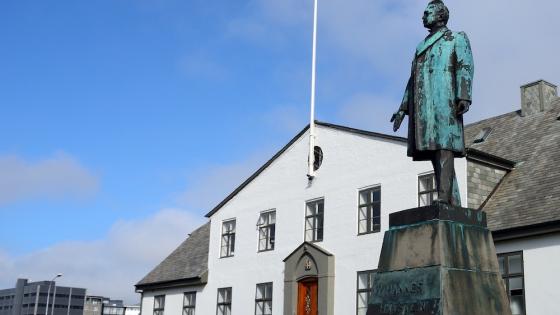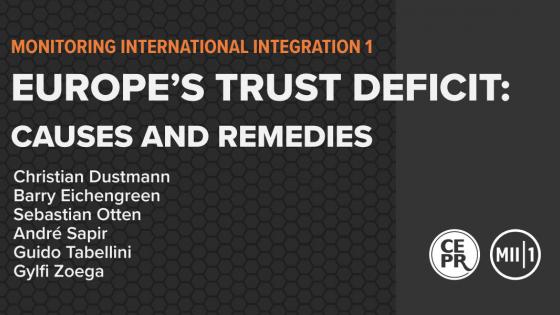In an attempted self-coup – an ‘autogolpe’ in Spanish – a sitting ruler tries to hold on to power by suspending the constitution or by upending countervailing powers in the judiciary, executive, or legislative branches of government. The ‘steal’ of an election from a victorious opponent has been attempted only once in a democracy, twice if you include the recent putsch provoked by President Trump in the US – for which he was swiftly impeached by Congress. According to Chin, the sole self-coup in a democracy occurred in Costa Rica in 1948. This led to a civil war that lasted six weeks. Ever since, Costa Rica has been an unwavering democracy, scoring a perfect ten on (a scale from -10 to +10) by one of the most widely used measures of democracy, compiled under the Polity5 Project at the University of Maryland.
That is more than can be said for the US, whose democracy score sank from ten to eight during 2016-2018 according to the political scientists at Maryland. This is a notable setback for a country whose score was perfect each year from 1871 until 2015, with the sole exception of 1967-1973. In the US, democracy is deemed to have faltered only under President Nixon, who won election in 1968 and resigned in disgrace in 1974, and under President Trump, who was elected in 2016 and lost election in 2020, leaving office in disgrace. Nixon avoided prison by resigning, allowing his successor, President Ford, to pardon him. Nixon's acceptance of the pardon implied his admission of guilt according to a Supreme Court verdict from 1915. It remains to be seen if Trump goes to prison.
The US is not alone. The political scientists at Maryland have lowered the UK´s democracy score from ten to eight for 2016-2018. This is compared to a perfect score of ten each year from 1922 to 2015 – a heavy blow to the country’s prestige. Even Poland and Hungary – where human rights have suffered in recent years – retain their scores of ten for 2016-2018. According to these figures, the illiberal regimes in Poland and Hungary have been less injurious to democracy than the untruths promoted by Republicans and Conservatives in the US and the UK.
How could things go so badly wrong in the US and the UK, but not in Germany or Italy? Germany has scored ten each year since unification in 1990, as did West Germany from 1949 to 1990. Italy has scored ten each year since 1948. This matters not only because democracy is an inalienable part of universal human rights but also because democracy is good for growth and perhaps even equality (Acemoğlu et al. 2014a, 2014b).
Big lies, lost causes
Recent book titles by historians, philosophers, and political scientists provide ominous accounts of creeping fascism within our societies. These include Page and Gilens's Democracy in America?, Levitsky and Ziblatt's How Democracies Die, Mounk's People vs. Democracy, Runciman's How Democracy Ends, Snyder's Road to Unfreedom, Stanley's How Fascism Works, and Diamond's Ill Winds: Saving Democracy from Russian Rage, Chinese Ambition, and American Complacency (see also Acemoğlu et al. 2020 and Cagé et al. 2021).
It is important to ask why democracy today seems to face more daunting challenges in the US than in Germany or Italy. One part of the answer may have to do with the lack of respect for truth. Germany learned this the hard way. After WWI, a big lie – the stab-in-the-back myth (“Dolchstosslegende” in German) – helped create conditions for the ascendance of Nazism. After WWII, however, those who lost faced more reasonable justice underscored by the Marshall Plan. Germans were told, and told each other, the truth about Nazism. This meant that France and other European nations felt they could safely share their sovereignty with Germany, based on mutual trust within the architecture of the EU. Chancellor Helmut Kohl declared that shared sovereignty was the key to assuring Germany´s neighbours that they did not need to fear renewed German aggression. Diminished trust threatens to undermine unity with Europe (Dustmann et al. 2017).
The US experience was different. The civil war of 1861-1865, and President Lincoln's assassination in 1865, were followed by an incomplete reconstruction. This enabled the Southern States that lost the war to persist in their maltreatment of African Americans for another 100 years, despite the abolition of slavery by law under Lincoln. Without proper reconstruction, the lost cause of slavery helped perpetuate the lie that the emancipation of slaves was not meant to free them from continued abuse and discrimination – a lie that swept a significant segment of political support in the South from Democrats to Republicans after the passage of the civil rights legislation in the 1960s. Rather than fading away, white supremacists found a new home.
This is not the sole American example of an ambivalent attitude toward truth in recent years. The wars in Vietnam and Iraq were grounded in deception. Opinion polls have consistently shown that a significant majority of Americans believe that they have not been told the whole truth about the assassination of President Kennedy, an opinion supported by Congress in 1978. Only recently has the US government begun to recognise that domestic right-wing terrorists, closely allied with white supremacists, constitute a threat to US national security. Just as the FBI pursued alleged communists rather than the mafia in J Edgar Hoover´s time, the FBI had to appeal to the public for help with identifying some of the main perpetrators of the attack on the Capitol on 06 January 2021. More respect for the truth in the past would have reduced the plausibility of further lies in the minds of many people.
Failed states?
There is much at stake. Former British Prime Minister, Gordon Brown recently warned that, without reform, the UK risks becoming a failed state. Several observers have expressed similar concerns about the US. Lies designed to undermine the democratic order, lies about the EU ahead of the Brexit vote in the UK, and false allegations of election fraud in the US are at the heart of both countries´ crises – crises that have been exacerbated by the pandemic. Their allies in NATO and elsewhere have reason to worry about their trustworthiness, even if Congress and the courts managed to deflect the recent putsch in the US. President Trump compounded the crisis by appointing an assortment of incompetent individuals to high office.
When the leaders of valued senior allies misbehave, others take notice, seeking cover. My native country Iceland is a case in point. Iceland is a country that some observers have begun to view as a failed state. Their analysis rests on three main points.
First, Iceland has a serious problem with its Russia-style oligarchs. These are usually owners of fishing vessels, whom the political class has enriched by awarding them free (or virtually free) access to Iceland´s valuable fish resources. In exchange for cash, the politicians have created a fish-based ruling class that behaves like a state within the state, dictating policy platforms to political parties, court verdicts, newspaper editorials, some academic appointments, and more.
Second, this alliance of politicians and oligarchs has persisted in unapologetically disregarding the result of a 2012 national referendum, where 67% of the voters declared their support for a new post-crash constitution drawn up by a constitutional assembly elected by the nation in 2010. This new constitution’s single most important provision declares the natural resources of Iceland are to be the “common and perpetual property of the nation”. Some of the oligarchs in question are currently in trouble with the law in Namibia, where former ministers and others have languished in jail for more than a year, suspected of having received bribes from Iceland´s largest fishing firm in return for catch quotas in African waters.
Third, Iceland´s civil service and court system are stacked with political appointees who, as members, take their cue from the political class. Large swaths of the business community fit the same pattern. Iceland´s largest right-of-centre party, the Independence Party, and the largest business association, the Confederation of Icelandic Enterprise, both oppose Icelandic EU membership. Many of them have expressed support for Trump and Brexit. Trust has collapsed, with Gallup reporting that only 23% of its Icelandic respondents trust parliament, and only 37% trust the court system (see Gylfason 2019, 2020).
Reconciliation
How can such conflicts be reconciled? How can trust be restored? Would reform be enough? Perhaps. But the US appears to need more than that. Some advocate the establishment of a Truth and Reconciliation Committee. Others claim that such committees are appropriate only in situations where the courts cannot cope. If so, the US needs to deal in court with the alleged crimes and misdemeanors of former President Trump and his Republican associates. Reconciliation without truth and without remorse is impossible. Therefore, judicial verdicts appear to be the only possible solution to the political predicament in the US, as well as in other countries that have taken a similar path. Let Namibia show the way.
References
Acemoğlu, D, S Naidu, P Restrepo and J Robinson (2014a), “Can democracy help with inequality?”, VoxEU.org, 7 February.
Acemoğlu, D, S Naidu, J Robinson and P Restrepo (2014b), “Democracy causes economic development?”, VoxEU.org, 19 May.
Acemoğlu, D, G De Feo, G De Luca and G Russo (2020), “Revisiting the rise of Italian fascism”, VoxEU.org, 28 October.
Cagé, J, A Dagorret, P Grosjean and S Jha (2012), “Heroes and villains: How networks of influential individuals helped destroy one of the world’s most durable democracies and legitimise a racist, authoritarian state”, VoxEU.org, 17 January.
Diamond, L (2019), Ill Winds: Saving Democracy from Russian Rage, Chinese Ambition, and American Complacency, London: Penguin Press.
Dustmann, C, B Eichengreen, S Otten, A Sapir, G Tabellini and G Zoega (2017), “Populism and trust in Europe”, VoxEU.org, 23 August.
Gylfason, T (2019), “Ten Years After: Iceland´s Unfinished Business”, in R Z Aliber and G Zoega (eds), The 2008 Global Financial Crisis in Retrospect, London: Palgrave Macmillan.
Gylfason, T (2020), “Reversing the retreat of democracy: The case of Iceland.“ VoxEU.org, 19 February.
Levitsky, S and D Ziblatt (2018), How Democracies Die, New York, NY: Crown Publishing Group.
Mounk, Y (2018), The People V. Democracy: Why Our Freedom Is in Danger & How to Save It, Cambridge, MA: Harvard University Press.
Page, B I and M Gilens (2017), Democracy in America?, Chicago, IL: University of Chicago Press.
Runciman, D (2018), How Democracy Ends, New York, NY: Basic Books.
Snyder, T (2018), Road to Unfreedom, New York, NY: Tim Duggan Books.
Stanley, J (2018), How Fascism Works, New York, NY: Random House.



